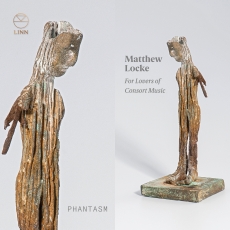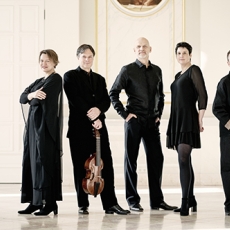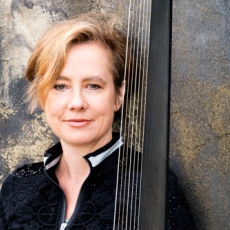Phantasm - Locke - Europadisc
The term ‘chamber music’ usually brings to mind quartets, quintets, trios and sonatas by a succession of composers ranging from Haydn, Mozart and Beethoven, via Schumann and Brahms, to such 20th-century figures as Schoenberg, Janácek, Bartók and Tippett, to name but a very few. For lovers of Baroque music, the names Couperin, Corelli and Bach will loom large. But delve back less than a century before that trio, and real treasures are to be found in the English consort tradition, boasting such names as William Lawes, John Jenkins and Christopher Simpson. English consort music of the seventeenth century, either for ‘whole’ consort (all from the same instrumental family) or ‘broken’ (a mix of viols and violins, for example), contains some of the greatest jewels of the repertoire, and one of its greatest practitioners was Matthew Locke (c.1621-1677).
Born in Exeter, where he sang in the cathedral choir, Locke established himself during the latter years of Charles I’s reign (he may have been among those who accompanied the future Charles II to France), rose to prominence during the years of the Cromwellian Commonwealth, and by the time of the Restoration in 1660 was England’s leading composer. His legacy includes an impressive corpus of sacred music (in English and Latin), as well an important body of music for the stage; but it is his consort music that contains some of the greatest pearls, for it was here that he was best able to indulge his gift for startling harmonic juxtapositions, wide-spaced textures and astonishing variety of invention in its purest form, unshackled by the demands of text or stage action.
There is currently no group better qualified to present this music than the viol consort Phantasm. Founded in 1994, they first visited these works on disc twenty years ago on GMN’s ClassicalPlus label. This time round, with a string of critically-acclaimed Linn discs to their credit (including Byrd, Tye, Dowland and Lawes), the big difference is that they are joined by lutenist Elizabeth Kenny on theorbo, providing a continuo which enriches the textures, adding extra depth to the slower passages and greatly enlivening the faster dances.
Entitled ‘For Lovers of Consort Music’, this new release contains all six suites of Locke’s Consort of Four Parts, as well as two suites from The Flat Consort (in C minor and B flat major). The latter two works, scored for three viols, are the more expansive, alternating fantazies with progressively faster dances (courante, saraband and jigg). But it is the four-part suites that contain the biggest surprises, for surely few other composers could create such dazzling variety while sticking doggedly to the same succession of movements in each work (fantazie – courante – ayre – saraband). The fantazies alternate slow and fast sections, the courantes are poised yet lively, while the sarabands (quite unlike the languorous, introspective sarabandes of Bach) are exuberant, toe-tapping affairs, especially when accompanied by strumming theorbo.
Highlights? Too many to mention them all, but the opening of Suite no.3 in F major is like sinking into a warm bath, Suite no.2 in D minor/major ranges from an earnest contrapuntal introduction that seems to look forward to Bach to an indecently jolly concluding Saraband, while no.6 in G major exudes radiant good humour. The opening of Suite no.5 in G minor is heart-wrenchingly introspective, evoking Dowland and a bygone age; and at a rather different point on the emotional spectrum, it’s a delightful touch to have the theorbo pluck the opening phrase of the F major Suite’s Saraband, answered immediately by the viols.
Tuning throughout is flawless, rhythms are tight, with brilliantly alert upbeats, and the beautiful shaping of phrases is a source of constant wonder. Recorded in Broxgrove Priory, Sussex, the sound is warm, sympathetic but stunningly clear and detailed, and the balance between bowed viols and the plucked theorbo is ideal and natural. Framed by the two Flat Consort suites, and with two searchingly-played, brilliantly devised canons (which the Leipzig cantor himself might have envied) thrown in for good measure, this disc is a veritable cornucopia of delights. Not just ‘for lovers of consort music’, then, but for all lovers of chamber music, immaculately conceived and executed. Essential listening indeed!


